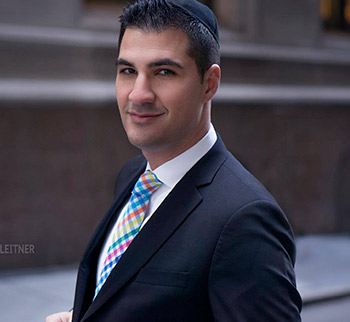Following a relationship with the late Rabbi Ovadia Yosef that spanned almost a decade and included six years of diligent research, Yehuda Azoulay has published a book about the Sephardi chief rabbi of Israel, who was equally influential and controversial.
“Encyclopedic Torah knowledge, fearless conviction, compassion and concern for each and every Jew, tireless energy, clarity of thought and expression – it is this combination of outstanding qualities that has made Hacham Ovadia Yosef the most influential rabbinic figure of our generation and one of the most influential rabbis in hundreds of years,” Azoulay wrote in the introduction of his 700-page book, released as part of a series published through the Sephardic Legacy Series Institute, a non-profit organization Azoulay founded years ago to promote Sephardi culture.
Speaking to The CJN about Maran – The Life and Scholarship of Hacham Ovadia Yosef, Azoulay said he was drawn to the Baghdad-born rabbi, who died last year at the age of 93, ever since he met him 10 years ago.
“When I was 18, I had attended his lectures in Hebrew when I was in yeshiva [in Israel]. I was drawn towards him, his scholarship and his humour. Granted, many people may consider him controversial,” he said, “but there is no rabbi in the State of Israel over the last 65 years, from both a Sephardi and Ashkenazi perspective – everyone would agree with me unanimously – about how influential this rabbi was,” Azoulay said.
“I got close to him because I pretty much pushed my way in to get familiar with his family. I was with them for the holidays. I would fly in from Toronto or New York when I used to live there… As time went on, they brought me within their quarters… We had a relationship,” he said adding his research included one-on-one interviews with the rabbi, Knesset members, family members and others who were close to him.
He said over the past six years, he and a team of five researchers read 28 Hebrew biographies about the rabbi, and all of Rabbi Yosef’s 53 books.
“His books are beyond academic – only religious people who understand the questions and answers and so on would appreciate the scholarship,” he said. “Within those books there were anecdotes. He talked about experiences in his life, about World War II, he talked about Hitler, about the Damascus blood libel in the 18th century, he goes through history, talks about life and experiences through Jewish law.”
Azoulay said one of the things he admired about the rabbi was his diligence.
“He was extremely focused as an individual and had an unbelievable dedication to Torah study, as well as a sensitivity towards every single Jew,” he said.
“I think the overall message that I learned from him personally is that you shouldn’t take time for granted. He was all about time. He was extremely accomplished.”
Although he acknowledged that the rabbi, who was founder and leader of Israel’s Shas party, had found himself in hot water over the years because of comments he made about victims of the Holocaust, the victims of Hurricane Katrina that devastated New Orleans in 2005, and the role of Jewish women, among other issues, Azoulay decided not to delve deeply into those issues in his book.
“Many Jews have a negative impression of Hacham Ovadia due to his political involvement and his sometimes biting style of expression,” he wrote in the book’s introduction. “This biography will touch on various controversies surrounding this larger-than-life figure, but we will by no means attempt to justify all the comments taken out of context and bandied about by critics [and] the media. We feel that political faux pas are extraneous to this study.”
What’s more important is the positive influence he had on Jewish and Israeli society, he said.
“Because of him there are 80,000 Ethiopian Jews – every Ethiopian in the state of Israel is considered Jewish thanks to him.”
In the 1970s, following his appointment as Israel’s Sephardi chief rabbi, he ruled that Ethiopian Jews were unquestionably Jewish, allowing them to marry other Jews without having to convert.
“Furthermore, he created both an identity and a halachic framework for the Sephardi Jews of the Land of Israel that will not dissolve with his passing,” Azoulay said.
“He left a major void in the Sephardi world in terms of leadership. There is really no one like him. There are other chief rabbis, great rabbis, but definitely, over the past 100 years, no one has done what he’s done and everybody knows that and no one would disagree with me.”
